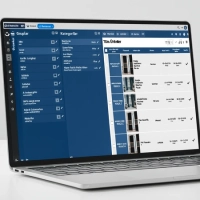
In today's rapidly digitizing logistics world, shipment management systems are one of the most critical software tools that enhance companies' competitiveness. Shipment planning and tracking processes performed using traditional methods now mean wasted time, high costs, and the risk of errors. This is where shipment management systems consolidate the entire process on a single digital platform, controlling every step from planning to delivery. Comwize , with its innovative solutions, helps companies achieve this transformation in the most efficient and reliable way.
A shipment management system (SMS) ensures that orders in the supply chain are delivered on time, at the most cost-effective rate, and in full. This software manages the entire shipping process end-to-end, from warehouse departure to route planning, carrier selection, and final delivery. Real-time tracking and automated reporting allow managers to closely monitor operations and make instantaneous decisions, improving efficiency. SMS has become a crucial investment not only for large logistics companies but also for all sectors, including e-commerce, manufacturing, retail, and distribution.
How Does a Shipment Management System Work?
The shipment management system begins operating when the order is ready to leave the warehouse. The system first plans the loading process and then determines the most suitable route and transportation mode. Parameters such as traffic conditions, fuel costs, and delivery priorities are automatically evaluated during this process. GPS-based tracking is activated once the shipment is on its way, and every step is reflected in the system in real time. This allows managers and customers to see the shipment's location, estimated arrival time, and potential delays. Once the delivery is completed, the system automatically generates cost and performance reports.
Comwize's shipping management solutions support every step of this process with an integration-focused approach. The Comwize platform, which seamlessly integrates with ERP, warehouse management systems (WMS), and e-commerce infrastructures, allows for simultaneous management of both order and shipping operations from a single dashboard. This saves companies time and effort while eliminating errors caused by manual data entry.
Key Benefits for Businesses
The most significant advantage of a shipment management system is cost control and operational efficiency . Automated planning, such as route optimization and carrier selection, reduces fuel consumption and empty vehicle runs, lowering overall logistics costs. Real-time tracking minimizes incorrect or delayed deliveries and increases customer satisfaction. Furthermore, the data collected in the system allows managers to make more accurate future predictions and strategic decisions.
Comwize offers companies specialized reporting and analysis modules to strengthen data-driven decision-making processes. Whether you're a retailer delivering within a single city or a large logistics company shipping internationally, Comwize's flexible architecture helps you scale your entire operation.
Why Comwize Solutions?
Comwize approaches shipment management not just as a software solution, but as an end-to-end solution. Its cloud-based infrastructure makes it accessible from anywhere, and its mobile-friendly interface simplifies the work of field teams and drivers. API-based integration enables rapid installation with existing ERP or e-commerce systems. Furthermore, advanced security protocols protect your data, and authorization options ensure only the right people have access to the right information.
Comwize's intelligent route planning, live tracking, and automated cost reporting help businesses streamline their daily operations and offer long-term sustainable growth. This allows companies to increase their profitability and gain a competitive advantage in customer satisfaction.
Future-Ready Digital Logistics
The world of logistics is rapidly transforming with new trends like IoT devices, AI-powered forecasting, and carbon footprint tracking. Comwize offers a transformation-ready infrastructure with its shipment management system. AI-powered analytics enable continuous optimization of routes, and carbon emission reports contribute to sustainability goals.
In today's competitive environment, investing in a shipment management system isn't just about streamlining operations; it's also a strategic investment in the future. Comwize's innovative solutions fully address both today's and tomorrow's needs by transitioning your business's logistics processes into the digital age.
Conclusion
A shipment management system is no longer a luxury but a fundamental necessity in logistics and supply chain management. With the right system, companies reduce operational costs, increase delivery speed, and strengthen customer satisfaction. Comwize's advanced shipment management solutions make this transformation easy and reliable, helping companies stand out from the competition. Meet Comwize now to future-proof your logistics processes.

























